https://www.youtube.com/watch?v=JXKFwvtaZeM
How To Frost Every Cake _ Method Mastery _ Epicurious
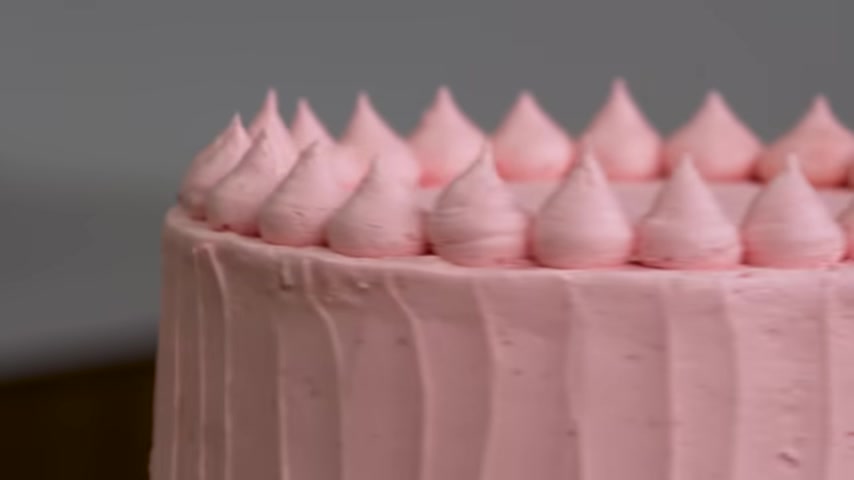
Hi , I'm Bill and I've been a professional baker for over 10 years and I'm going to show you how to frost every cake .
Everyone has a different way of frosting cakes .
I have some very specific and simple ones that I like to use .
So that's what we'll do today .
Cakes should look delicious first for anything else .
And that's why I lean towards this sort of style of classic butter cream and textures .
And there are incredible things that you can do with sugar and fondant and sculpture .
But for me , I love making cake that looks just delicious .
Here are the tools we use when decorating a cake with frosting .
The first and foremost that you're going to need is a turntable .
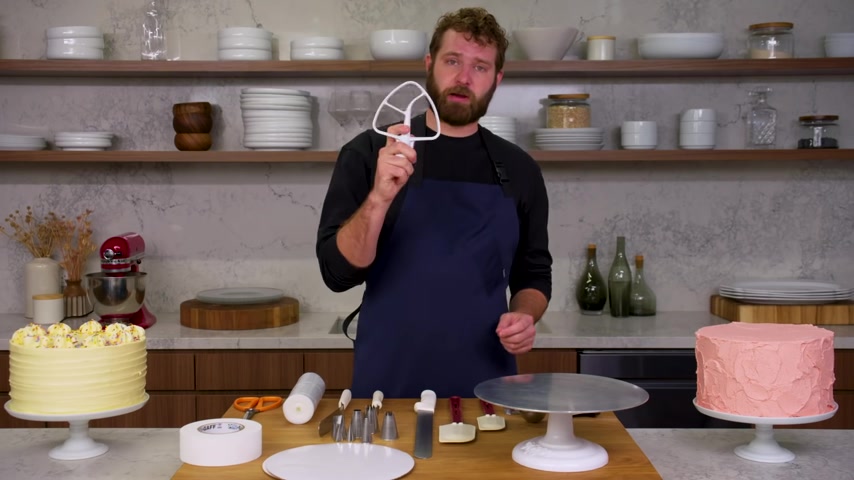
Next is the cardboard round that you're actually going to put the cake on with some tape to tape it to your turntable .
I make most of my butter creams with a paddle .
You can get it super nice and airy and also push out some of the air and make it nice and smooth .
I've got two offset spatulas , small , one for more detailed work and then this size offset which is sort of the workhorse of the whole operation , a knife to level the cake , two sizes of spatulas , a small and a large , a bench scraper and finally piping bags and piping tips .
This is what we'll use to decorate the cake after we get it all finished and put together .
Let's get started .
This is cream cheese frosting .
So in order to frost the cake , you have to make frosting , there are three different kinds of frosting that I typically use and I start with cream cheese frosting .
So this is room temperature cream cheese .
It's very important to have it be room temperature and you want it to get nice and light .
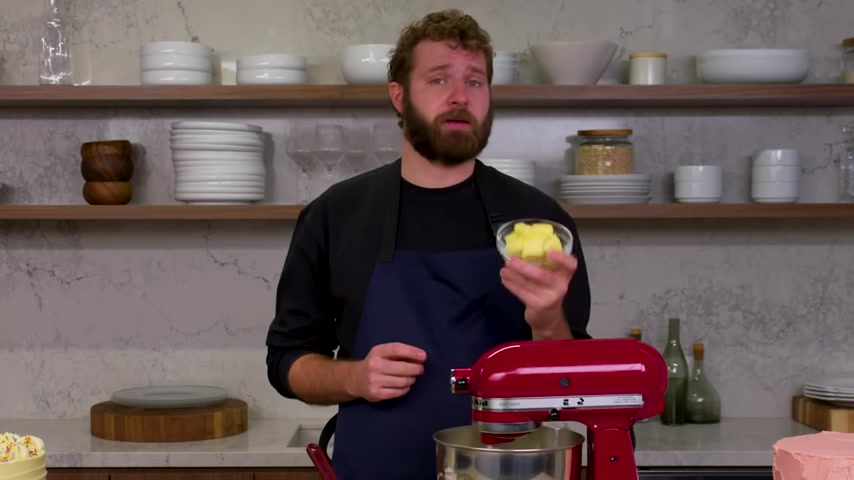
So we're going to start that first .
We're going to start adding room temperature butter .
It is important that you cream cheese and your butter are the same temperature that you're not trying to add a cold one into a warm one or vice versa .
And the butter is going to be added in small amounts .
So about a tablespoon at a time letting it sort of beat in .
The last thing you want is chunks of butter in your cream cheese butter .
Cream patience is key .
It takes a long time to make cream cheese butter cream .
Well , you want this to be super homogenous , ready to mix in the cocoa and sugar .
All right , this looks great .
As you can see , it's now super light , super fluffy and I'm going to mix in my cocoa first .
Very slub .
So you don't do that .
There we go .
I'm going to add in the sugar in about three batches just not to make a huge mess .
It looks like a lot of sugar .
It is not going to seem like a lot of sugar when it's fully incorporated though .
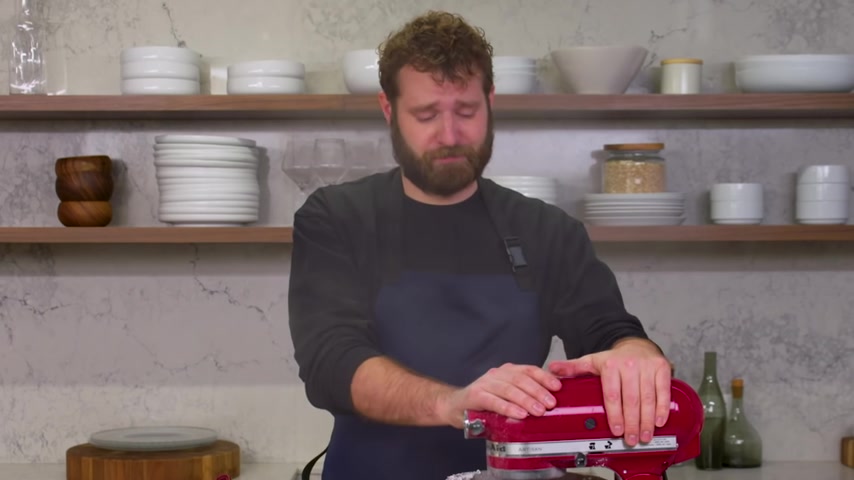
Like I said , it's a lot of sugar .
The final addition of the sugar and I'm going to go ahead and add in two teaspoons of salt too .
That's the other key to a great butter cream is a lot of salt .
We'll want this to run to start to dissolve the sugar .
You don't want to sort of taste the chalkiness of confection or sugar in your butter cream .
You want it to be super incorporated and really smooth and creamy and that's cream cheese frosting .
This is American buttercream .
American butter cream is super simple .
It is butter and sugar .
The trick is eating your butter and your sugar long enough to get it super super fluffy .
You want to get this totally smooth , really nice and light before you go ahead and add the sugar .
We're about halfway there .
Make sure that all of your butter gets to be nice and light and baked .
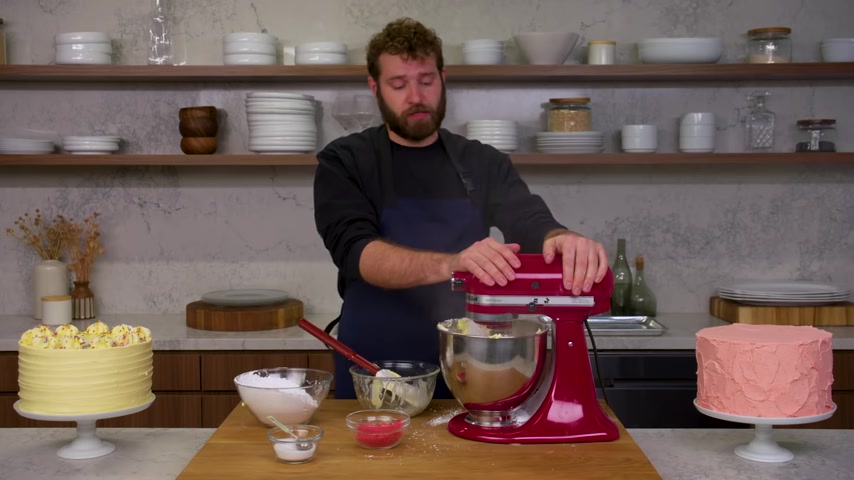
It's starting to look nice and silky and light fully changed color .
I'm going to add the sugar in a few batches as not to make a huge mess for my American butter cream .
I use a pretty standard ratio of three parts butter to four parts sugar .
It's going to almost look like a dough as you start to bring it together , it will get super light .
Now it's totally brought together .
It's made this super thick paste .
We're going to start kicking it up to beat some air into it .
This is about the time you can just go ahead and add your salt .
You can just sort of watch it change .
You want it to beat into kind of a cloud just like a really fluffy , easy to work with butter cream .
It's going to also feel like it's beating for a long time , right .
We're getting there so you can kind of take this and feel it in your fingers .
I'm still feeling a little bit of the sugar .
We'll keep it going for just a bit longer but not much at all .
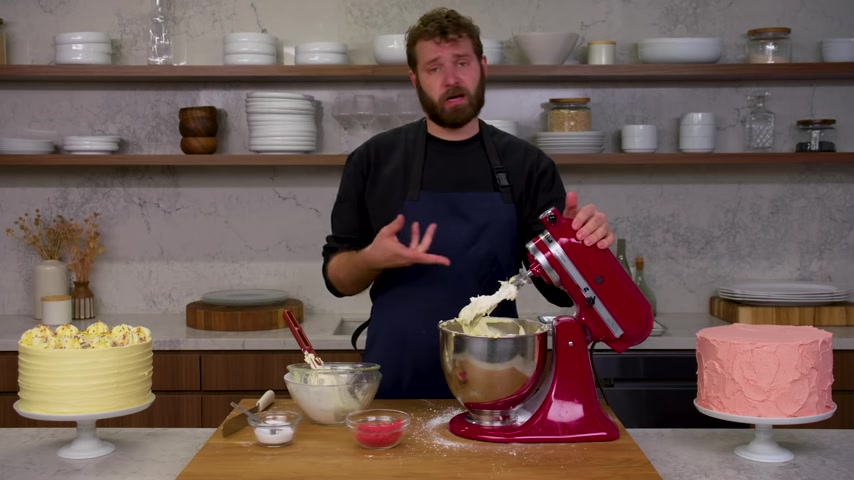
So this is a classic American butter cream base .
So here we could add vanilla , we could add booze .
You can add any kind of things to flavor it today .
I'm going to add some freeze dried powdered strawberry and that's American buttercream .
This is Swiss meringue butter cream .
The difference between Swiss meringue and cream cheese or American butter cream is that the base for this is cooked egg whites and sugar into a meringue with the fat , the butter fat beat into it .
What is great about this is , it's super stable .
It's also nice and glossy and kind of can get really smooth on the , on a cake .
So it is a little fancier to start this .
I'm going to use some egg whites , a double boiler .
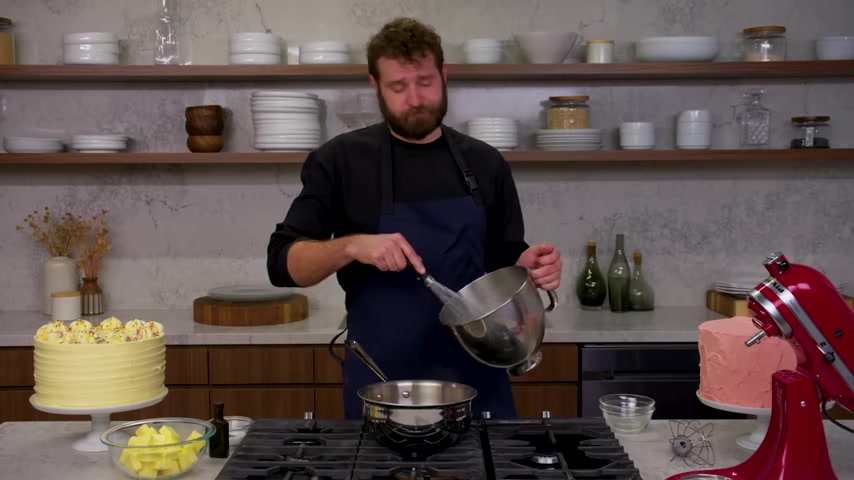
I'm going to use the bowl right from the mixer pot of simmering water , add my egg whites , granulated sugar and I'm just going to mix that up .
You want to take this to about 140 degrees .
You don't even need a thermometer really .
For this .
You can kind of do it by feel and touch .
I can still feel a little bit of sugar .
So I'm gonna take it a little bit longer , but you can see how it's getting a little frothy and fluffy .
This looks great .
I'm going to throw this right into the mixer .
We are going to use the whisk attachment this time , not the paddle , the slower and more gradual that you bring this to being a stiff meringue .
It's going to have more structure because the bubbles , the air bubbles and the air pockets are going to be just a little bit smaller and you're kind of building it up gradually .
So this is getting super glossy and fluffy .
It is take a minute to come up to a real full stiff peak .
And you also want to be able to feel the bottom of the bowl and this is still really hot .
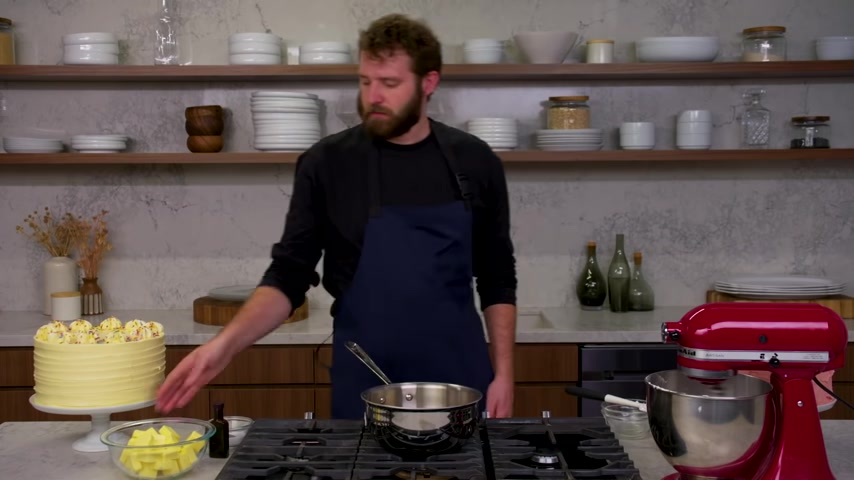
You want this to be totally room temperature , not warm at all before you start adding this room temperature butter again , we're going to stand here and watch it mix for a long time .
It's not quite stiff yet , but it is getting there right .
It's stiff , it's glossy , it's beautiful .
It is totally room temperature and I'm going to start adding in the butter piece by piece .
As you can see , it's starting to become stiff and cloud like it is essentially the color of the butter .
Add a little bit of vanilla extract to make super classic vanilla butter cream and again salt , of course salt .
It smells so good , just scrape it down , make sure it's all totally incorporated .
It's so glossy and so beautiful .
And that's Swiss meringue butter cream .
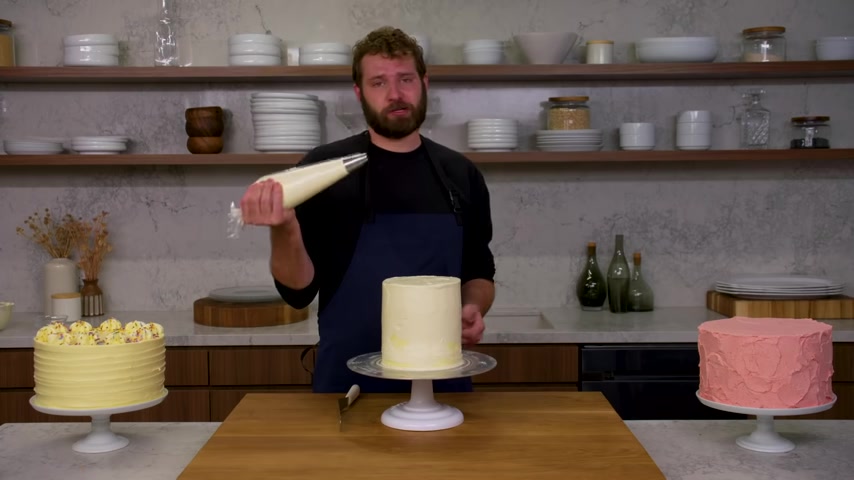
This is petals one exciting and beautiful way to finish your cake is what we call pedal finish done with a combination of a piping bag and an offset spatula .
It is a little time consuming , but it is incredibly simple .
So for this finish , you're going to start by piping .
I have a large round tip and I am going to pipe a line directly up the cake equal sizes and then you take your offset spatula and you just drag your spatula through half of the dot Scraping off your spatula in between each one , which is why it is a bit time consuming and then your next row goes right where you scraped off , try and keep them as close to the same size as possible .
All the way around the cake you can call this pals or fish scales .
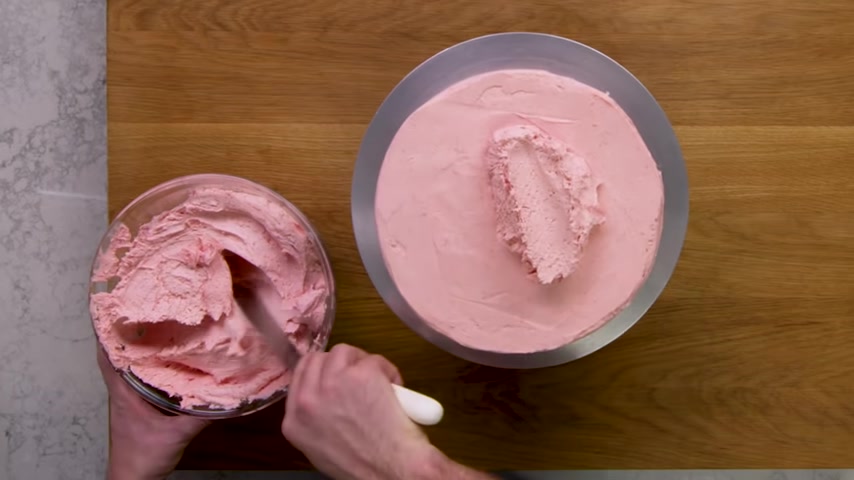
It looks so much more impressive than it is difficult .
This can be fun with alternating colors , tonal colors .
So the last row is the trickiest one .
You kind of just have to sneak this in and hide it .
It's never gonna be perfect and that's petals .
This is a horizontal texture with a spiral on top .
I'm just going to take some American butter cream and this cake has been crumb coated .
So I'm going to slap a little bit on here just to give myself a little more to work with .
This butter cream is a beautiful texture .
So because we are gonna do a texture on the side of this , it doesn't have to be the cleanest .
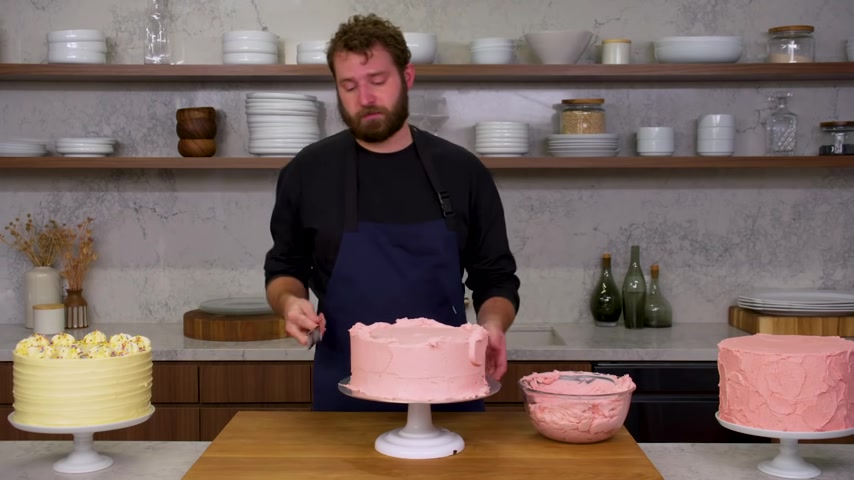
So I'm just gonna use the tip of this offset and I'm gonna put it right on the side of the cake and I'm gonna just quickly just go straight up the side of the cake , dragging my tip and then you're just gonna finish off the top as usual , nice and flat and even .
And then you can do the same exact thing , but just on the top .
So just go all the way around in a spiral on the top of the cake .
And that is a horizontal texture with a spiral on top .
This is vertical , continuing on with textured butter creams .
Again , American buttercream .
Super easy .
Classic way is a quick vertical .
I'm just going to make sure my spatula is nice and clean and I'm just going to run my spatula up the side of the cake .
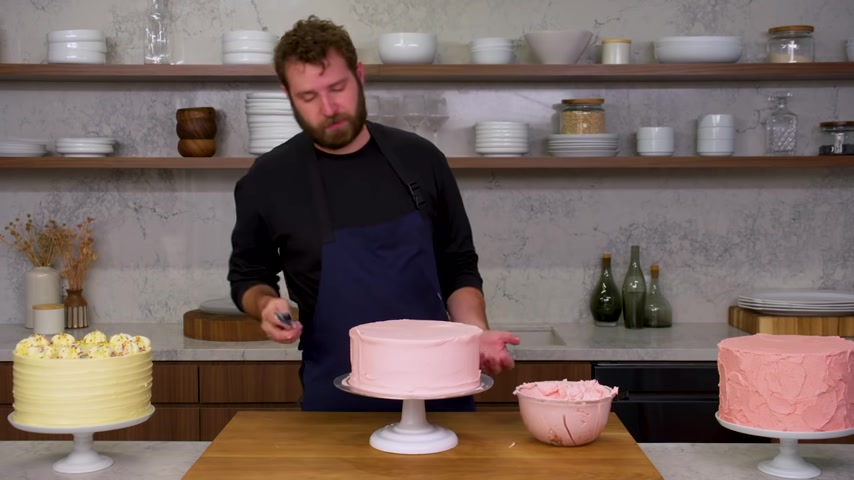
Now , it doesn't matter if you get this little lip on the top , we're gonna kind of clean it all up at the end .
You just go around and you can probably get two or three swipes out of it before you have to clean .
Your spatula butter cream is so flexible .
You can do it multiple times .
I mean , if you didn't like the way that this came out , smooth it out again , maybe add a little extra kind of little coat on there and then just do it again , it can be reworked and worked again .
And with this , I like to kind of juxtapose it with this nice smooth top .
I think that this texture really leans itself to simplicity .
Like I said , Rustic , simple , easy and that's vertical .
This is diagonal texture right now .
We're just gonna do a diagonal .
And I think that the easiest way to do this is to start at the bottom and go diagonally towards you as you kind of turn the table .
So we can just kind of go like this .
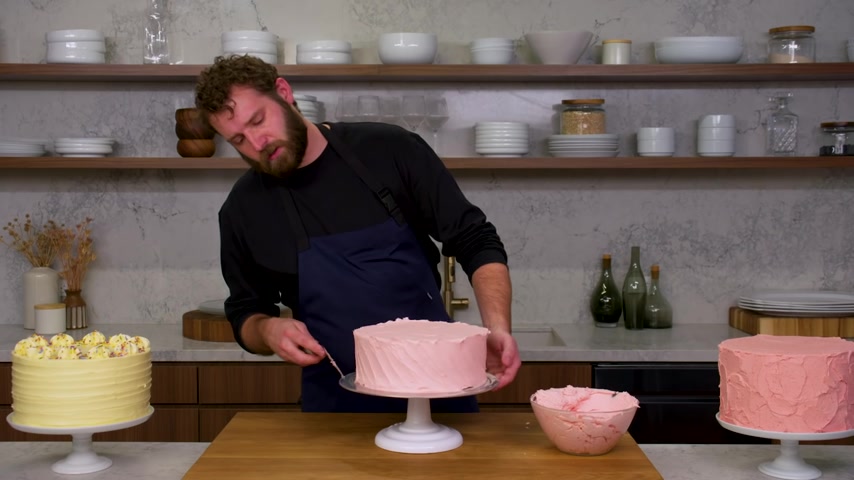
The key to this is trying to keep them all at a similar angle again , not being super concerned with the top because we're going to clean that up at the end anyhow .
And I think if they're kind of multi wits and overlapping looks really great with this key is to just sort of take it all the way to the top of the cake rather than having it stop part way .
If you don't get it all the way up to the top on the first go round , just go back around and hit it again .
Super simple .
And then there we go .
And that's diagonal texture .
This is swooshes and peaks .
So this is a from coated cake .
I'm just gonna kind of lay on some more butter cream starting from the top .
This cake is cold out of the fridge , which is a great way to start with a cake .
So after you've crumb coated it , stick it in the fridge or even in the freezer .
If you have space , you don't want this to be insanely thick because there already is a nice layer of butter cream on this cake .
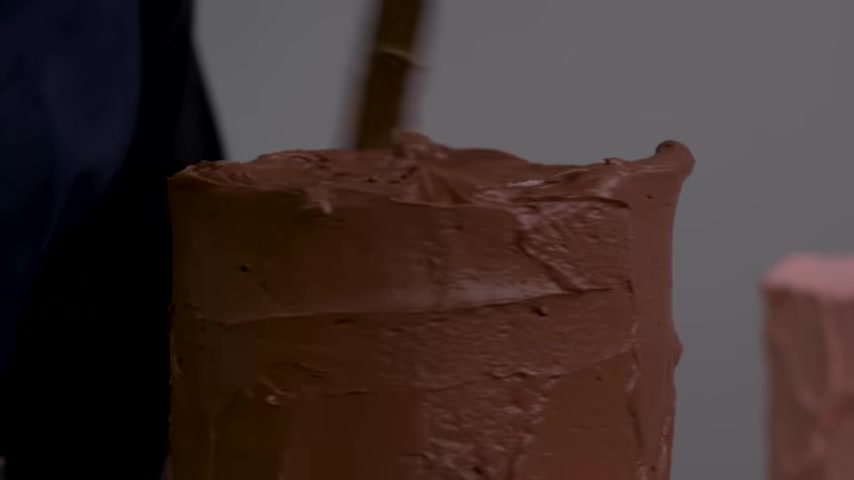
But you do want enough soft butter cream to be working the texture into .
Again , we're going to make sure we build it up above the top level of the cake , giving ourselves a little crown to work off of .
I'm just going to start kind of palling with the end of my spatula .
You don't want it to be a regular sort of up and down and up and down , just kind of a random palled sort of up and down swooshing texture all over the cake .
You don't want to just use the tip because you'll end up with these lines which we will use later on .
But if you use a little bit farther back on the spatula , you can get these nice big wide swooping palette marks and that's what we're going for right there .
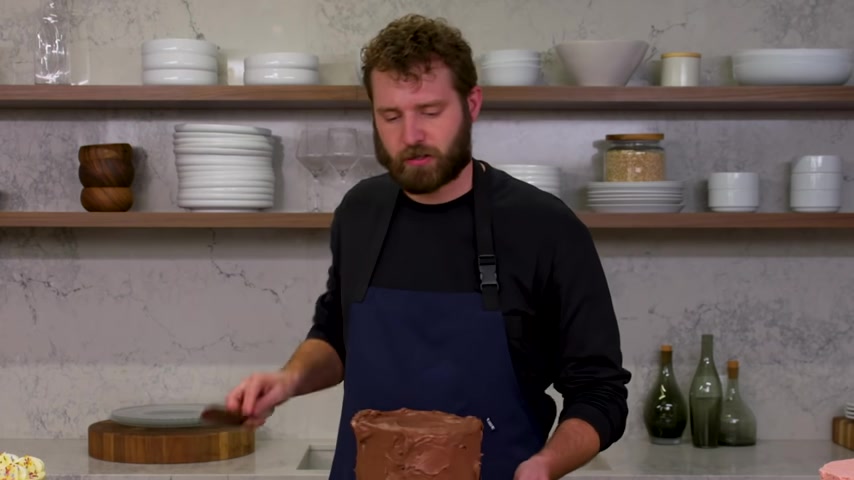
It should look unintentional but intentionally unintentional and I'm going to just finish off the top like we did on the base coat , dragging it , getting it nice and smooth and then I'm just gonna work these edges out .
I'm taking the excess butter cream off of my spatula every time I use it so that you're not accidentally dragging more on where you didn't want it .
It just gives you a little bit more control if you don't have a ton of butter cream on your spatula .
So just take a step back , make sure that it's staying level that it's looking straight up and down , kind of look and see where you need to just work it a little bit more .
And then you just have to find a point where you decide it's good .
This is kind of the classic birthday cake to me is this rough kind of swooping texture .
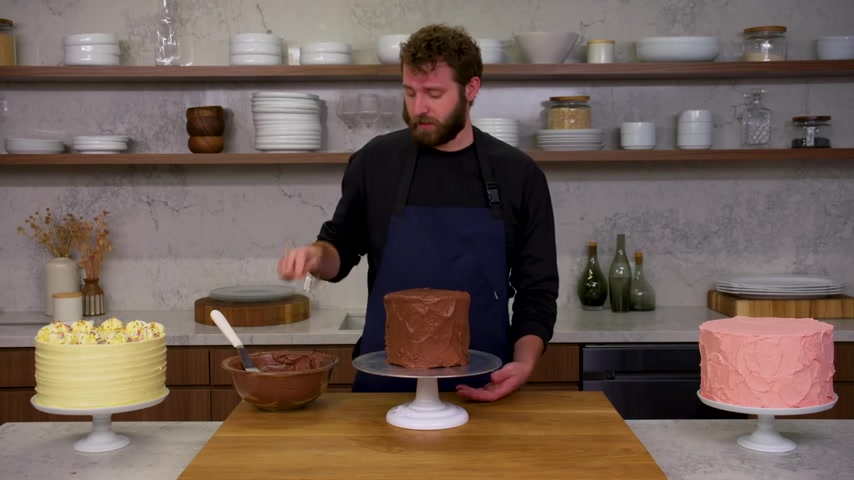
If you don't have an offset spatula , you can use the back of a big spoon and it's the same thing .
You can either lay it on , take it off , but the back of the spoon will also give you enough control to kind of make this rustic texture and that is swooshes and peaks .
This is waves .
Another super simple texture is sort of a wave horizontal pattern .
Similarly that we're going to lay it on and take it off .
So we have a nice base layer on top of our crumb coat and we've got it nice and smooth .
So now we're just gonna go ahead and mark the cake and I'm going to kind of just do short little passes all the way up the side of the cake .
And if you get two much butter cream , make sure you scrape it off , but you shouldn't be taking off too much butter cream with this .
We're going to kind of alternate this .
So I'm gonna make sure my next one goes kind of in between .
Again , a super rustic .
Very simple way of decorating a cake .
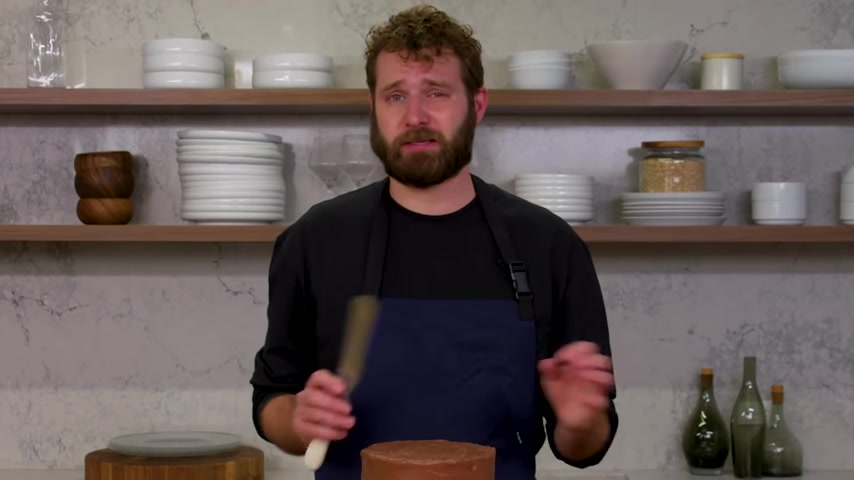
It doesn't require any tips or any piping bags .
I'm just going all the way around the cake and that is waves .
This is zig zag super easy .
It can be done in one continuous motion .
Just kind of an easy rustic fun fast way to finish a cake .
Any of these horizontal textures sort of cover any number of sins .
So if you do have your cake kind of a little messed up .
These are some great ways to kind of fix that .
So I'm just gonna use just the tip of my offset spatula and I'm just going to go like this all the way around and again , all the way up .
Another easy and beautiful way to finish a cake is just to shave some chocolate .
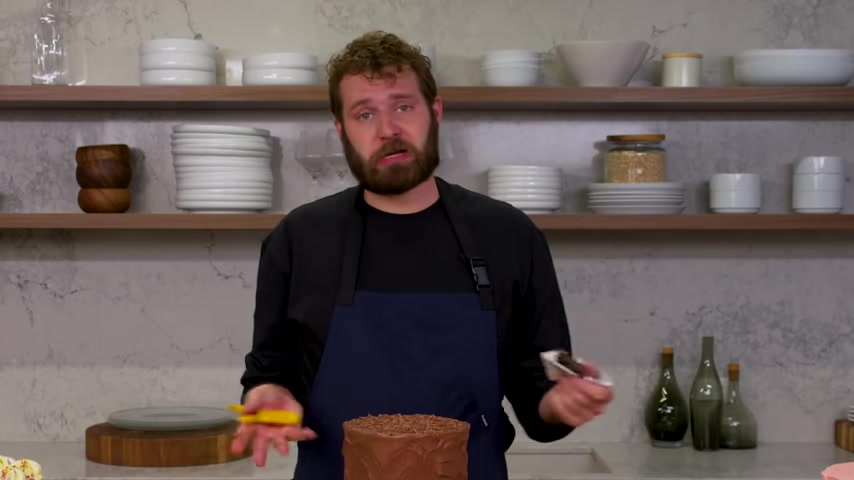
This is just a , a dark chocolate bar , a vegetable peeler and you can kind of just give it some chocolate shavings right on the top .
I love doing chocolate shavings or chocolate sprinkles on a chocolate cake .
I think the chocolate on chocolate always looks nice .
There we go .
Another easy rustic cake finish and that is zig zag .
This is smooth finish .
Now we're going to do a smooth sided cake .
Uh We're gonna be using the Swiss Meringue butter cream .
I'm going to do a rough coat again and then smooth it out using a bench scraper with the Swiss meringue in order to get a really smooth finish .
I'm sort of working this with my spatula to push some of the air bubbles out so that when we're finishing the coat , you're not catching all these big air bubbles and disrupting your nice smooth finish .
So I'm going to lay it on really thick and then take it off because we're really going to try and get this as smooth as possible .
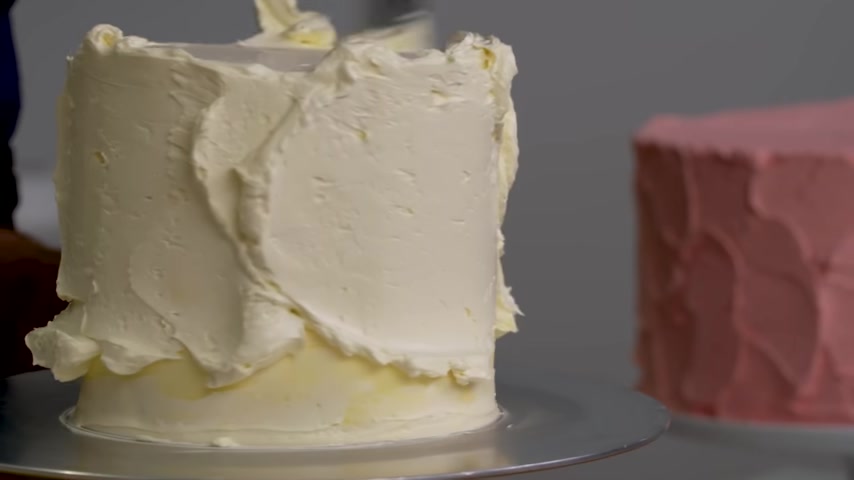
The Swiss meringue is so nice to work with .
It's so easy to build up your nice border on the top to kind of give yourself as much ability to kind of cut that corner really beautifully .
We're going to try and make this as crisp and clean as possible .
So I'm going to do as much smoothing as I can with my offset .
That's a total personal preference .
I'm going to kind of fill in where I've got these little holes on the side .
So now that I've got it pretty much smooth , I'm going to finish it and try and get it as super , super crisp as I can with this bench scraper .
So I'm going to hold this bench scraper exactly straight up and down , holding it not too close to the side and not too perpendicular to it .
I'm going to go at about a 45 degree angle and I'm going to try and do as big and long of a stroke with my turntable as possible .
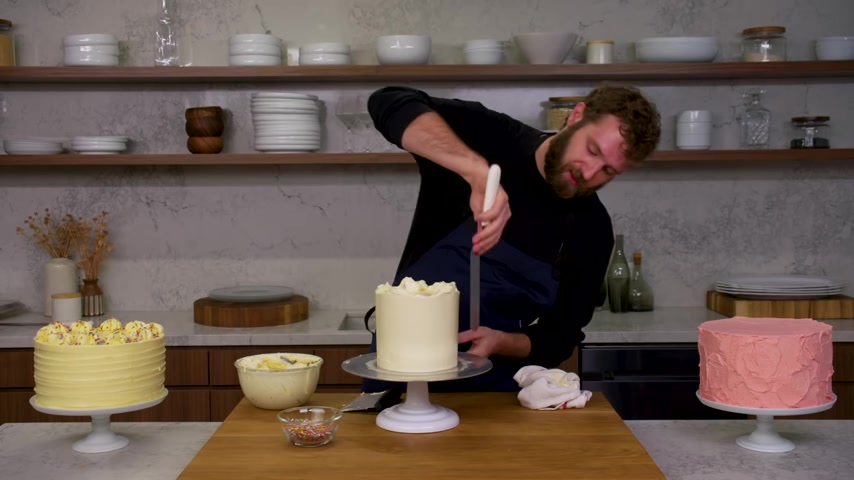
You don't want to kind of keep doing these short ones because you're going to get these skips and jumps in the butter cream .
You kind of want to be able to take one big long swoosh and this is why we really wanted to lay it on thick .
So you have this kind of room to pull off as much butter cream as you can to get it super smooth while still having a nice coat on the outside and not getting it too thin .
That is looking pretty smooth and you can go back in with a super clean spatula to kind of give it a little bit of touch ups here and there .
I'm just going to make sure that my spatula has really got nothing on it so that I have the cleanest edge possible and I can just kind of smooth out some of these tiny little imperfections .
So now that we've got the sides nice and smooth , I'm going to do the same for the top .
I'm gonna come in from the side and cut off that butter cream , giving ourselves a nice kind of crisp edge there .
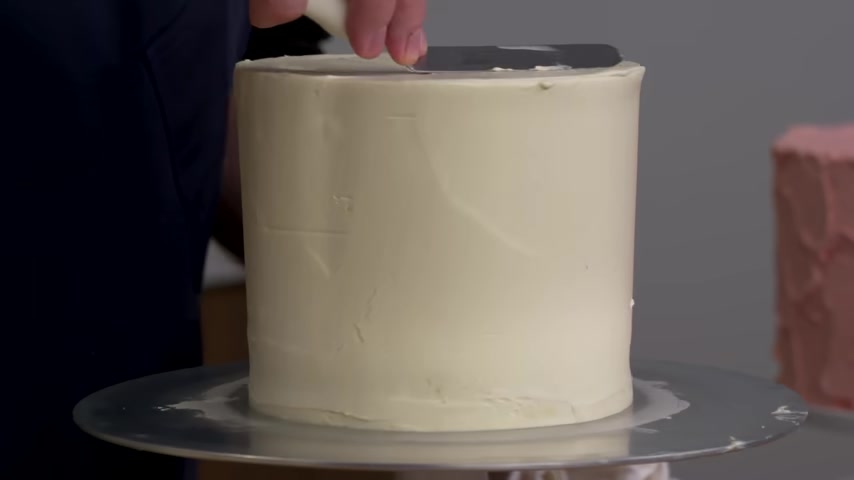
So you're gonna give it one pass to kind of rough it in and sort of get that bulk of that off and then you can go back in if you're trying to be super , super crisp with a small offset and really get that edge and smooth out that top .
Make sure you clean off your spatula in between every pass .
See how I've got this little kind of divot in the top easy .
Just put a little extra in there and then smooth it right over .
The great thing about a smooth cake is now you have a totally blank pat that you can do anything .
You can decorate it , you can pipe on it , you can do whatever .
And I really love to add sprinkles and I like sprinkles on the side of a cake .
And a good trick for doing that is to set your cake stand right in a sheet tray to catch your sprinkles as you do this .
And I've got some sprinkles right here .
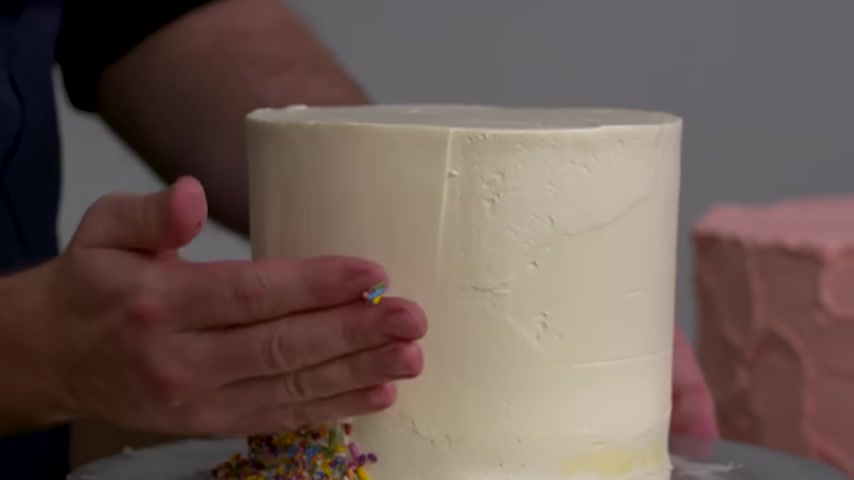
I'm gonna take them in my hand a decent amount and I'm slowly going to pack them on the sides of the cake .
You could do the whole cake , you can do part of a cake .
I think we're going to go about half way up .
It doesn't have to be perfectly even .
You're just kind of giving it this fun party vibe .
I love sprinkles and that is smooth finish .
This is a cake cone .
Another great way of adding some texture to the side of a cake .
Very easy is a cake comb .
So here we have a smooth sided cake laid it on a little bit thicker than I normally would because you're going to dig into it with this textured comb similar to using a bench scraper .
But this is going to add a little bit of texture to the side .
It's incredibly easy and can make your cakes look very fun .
This is just sort of a simple scallop , but they can come in in all sorts of different profiles .
So there's a lot of fun ways to do this .
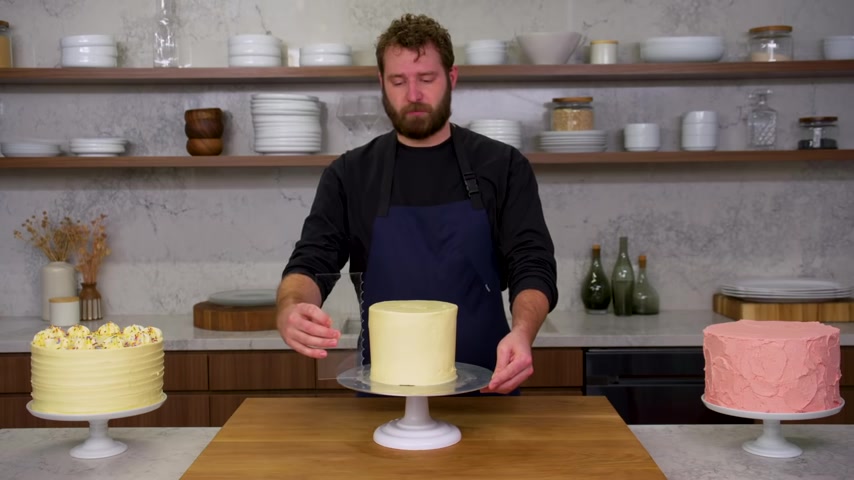
Again , you're not trying to take off a ton of butter cream .
So don't have it perfectly perpendicular to the side of your cake , sort of just at a slight angle and you're going to dig into the cake , careful not to press it all the way in .
So you're touching the cake itself , you want to just be texturing the outsides of butter cream , but you do want the full profile of the comb to be in the butter cream and then you're slowly just going to drag it again , trying to take long swipes with your turntable to not get stops and hitch .
And that's going to start to texture the sides of the butter cream .
And what you can do is just clean this off and then take another swipe at it again .
One of those really simple ways to make your cakes look super professional and finished without actually having to do some hard technical things .
And that's a cake comb .
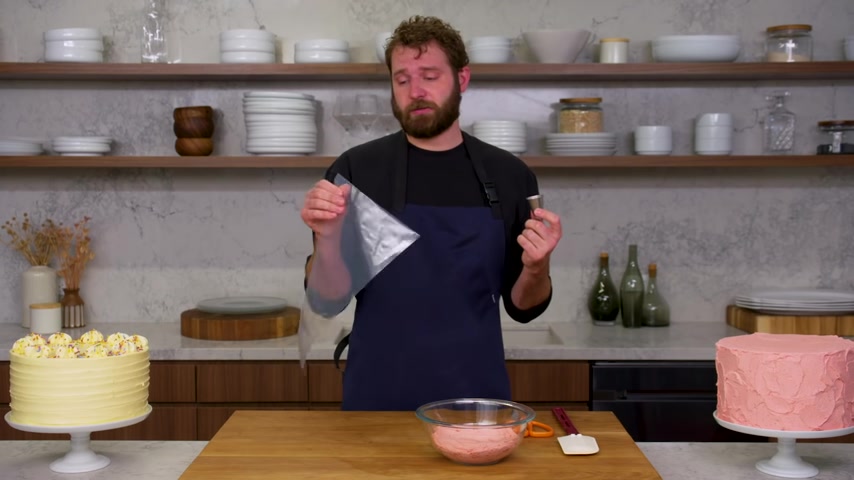
This is typing the way to finish a cake after we've got the base coat on is piping and there are infinite amount of piping tips and ways to pipe and techniques to pipe .
I'm going to do just a few simple ways to use a piping bag and piping tips to make cakes look beautiful .
There are a bunch of different kinds of piping bags .
I like to use these disposable .
This is an 18 inch bag .
I've got sort of a standard round tip .
This is a 87 .
So it's about that big around .
It's kind of a multi use workhorse of a tip .
So I'm going to cut off a portion of the plastic probably about that much .
Open the bag , drop the tip in and then just work it to the bottom like that .
There are a couple ways you can fill a bag .
I typically just do it in my hand .
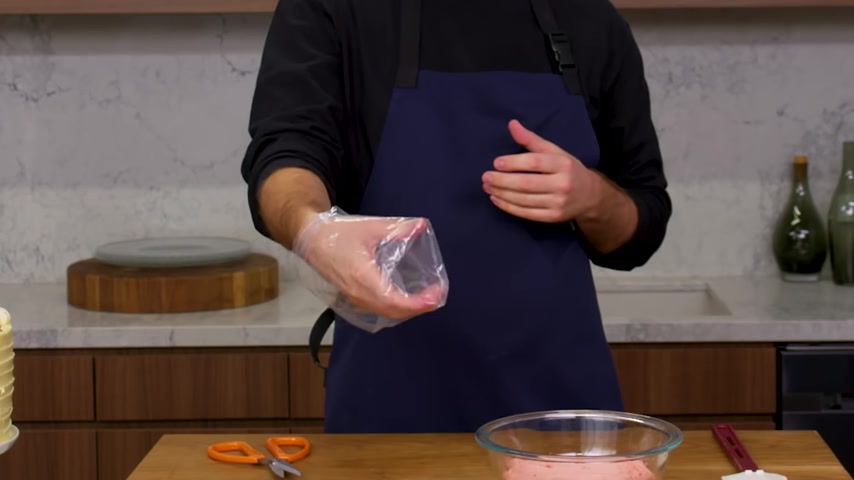
You want to kind of get your hand in a sea form , holding the bag open , keep it open and nice and neat as possible .
You want to start filling the piping bag closer down to the tip .
You don't want to kind of have too much bag that you're trying to pack the icing into just to keep it tidy and then just a rubber spatula , a big one I like to use .
And then this is just American butter cream and take a dollop of the butter cream and press it neatly into the bag like so and then I'm going to repeat that until the bag is filled .
So once you've got it filled , all you're gonna do and then give it a couple of twists and there you go , we're ready to start piping .
This is writing on a cake .
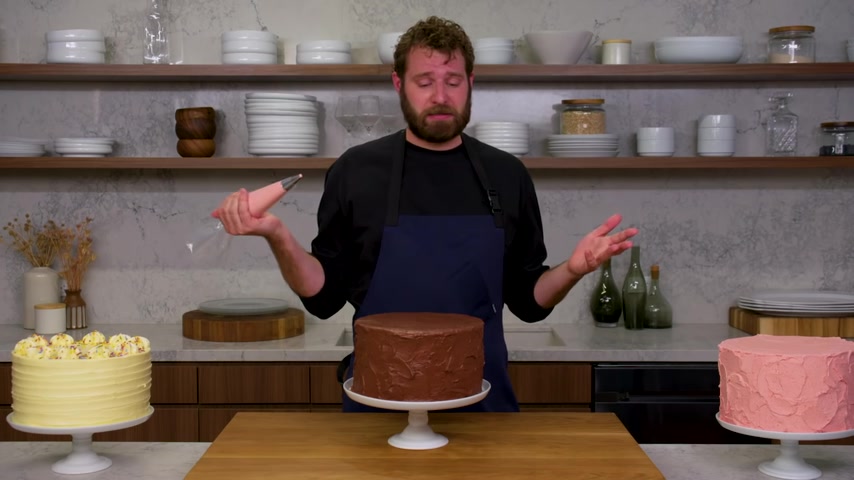
We can't talk about decorating a cake without talking about writing on a cake .
It is something that is can be pretty tricky but doesn't have to be , you can do block letters , you can do script .
And today I'm using a little bit of a wider tip just to kind of make it a little more bold and graphic .
But you can use anywhere from like a tiny , tiny , tiny pin dot to , you know , this is this one's kind of on the larger side .
It's always helpful to practice .
Oftentimes I will trace the diameter of the cake out on a piece of parchment paper with a sharpie and then just sort of , you know , practice a couple of times on that .
You're not wasting butter cream .
You can always scrape it off of the parchment paper and throw it back into your bowl again .
If you mess it up on the top of the cake , I have done that a million times .
You just scrape it off , clean the cake up a little bit and go for it again .
It's really not the end of the world .
So I'm going to just do a quick and simple happy birthday .
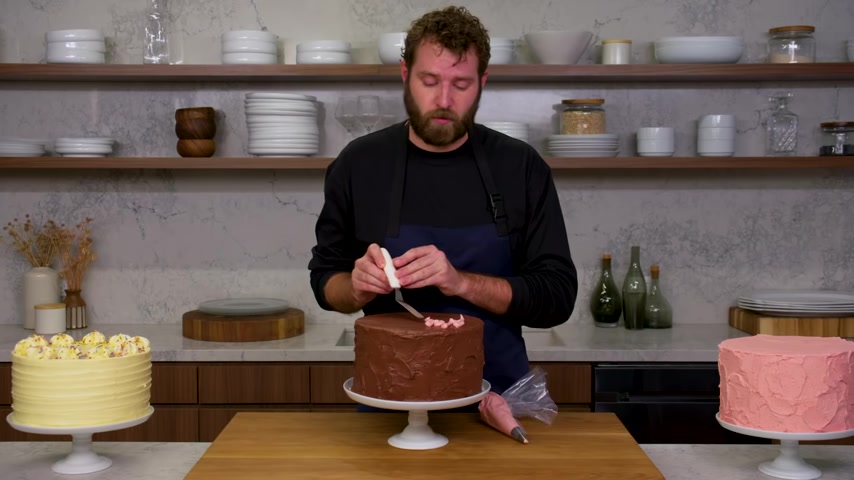
Now , if that happens , it's very easy .
Sometimes it's easier if your cake is cold to slide your little offset , just sort of drag it back into place and you can just kind of in the end , you're not really going to see it at all and then just keep going .
You want to use as even pressure as you can go as slow as you want .
Think about the angle of your letters .
You want kind of everything to be on a straight line and nice and tidy .
And if you get a break in it , if there's a bubble in your piping bag , that's OK .
Just fill it in a little dot On your eye across on the t tuck it in and there you go .
This is around tip .
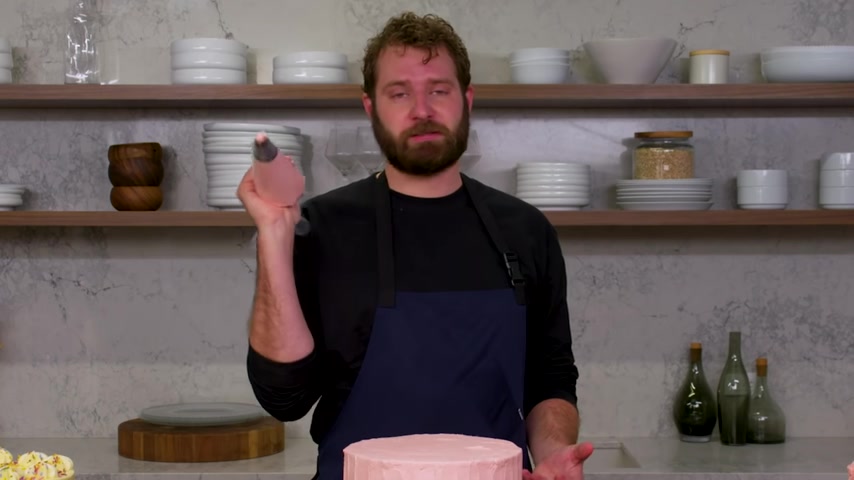
Do border keeping with the simplicity theme here .
One of my favorite ways to finish a cake is with our round tip again and it's just a simple dot border .
I think it goes super well with this vertical texture on the outside of this butter cream .
So I'm just going to give a small dot And pull up .
The key is to pull up while you're still applying slight pressure .
And also trying to keep every dot the same size , which can be a little tricky .
And if you don't keep it the same size , it's fine , can be slightly time consuming .
My cake decorating style tends to lean towards the grandma .
So this definitely fits in with that and that's a round tip dot border .
This is a star tip shell border .
One of the most classic finishing techniques is a shell border .
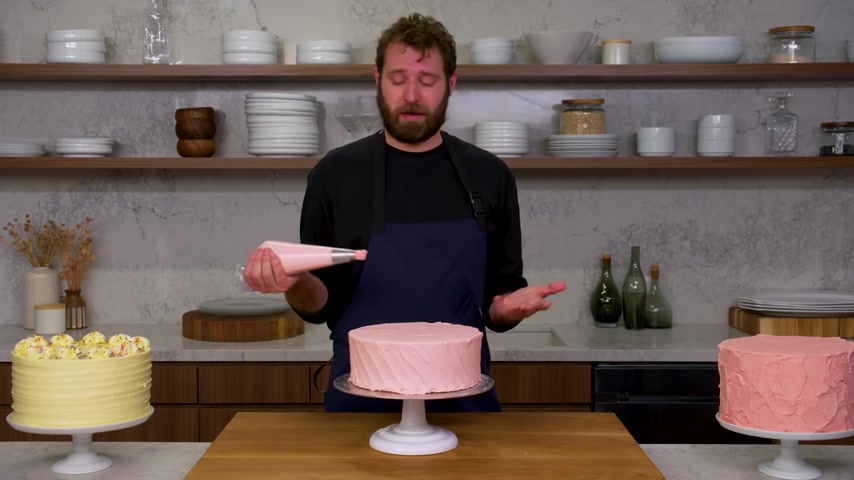
It's , you know , your classic grocery store cake , your local bakery and it's super simple .
I have that smaller star tip in and I'm going to just do a simple shell border .
So you kind of just give a little dot and drag uh dot And drag all the way around just trying to keep it as even as possible , both even in how close it is to the edge of the cake and the size of the shell itself , I really feel like you can put whatever combo you want together .
I don't think I've ever done this combination before , but it is , it looks good together or it's whatever you want to do .
And that's a star tip shell border .
This is a round tip cupcake .
Another vital skill is how to ice a cupcake .
And there are many ways of icing a cupcake .
This is a sort of classic way of icing a cupcake .
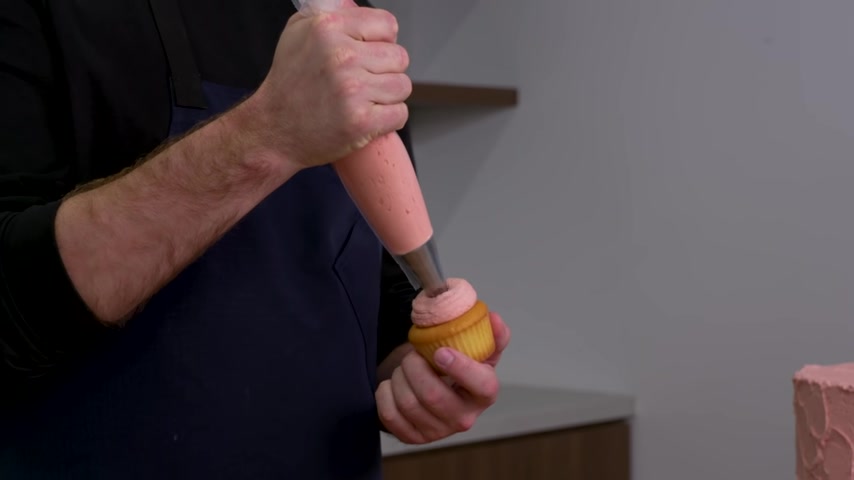
Simple , clean , I'm gonna use a round tip and a small offset .
So in order to do this , you just take your cupcake , take your large round tip right in the center and put a big dollop right there .
Take your small offset , push it into the center and swoop it around and again , just a big dollop and then a swoosh with your spatula , nice and clean and tidy classic cupcake .
And that is a round tip cupcake .
This is a large star cupcake .
Another great classic way to ice cupcake is a large star tip .
This is a technique I've used at most of the bakeries I've worked at .
It is super simple .
Very classic .
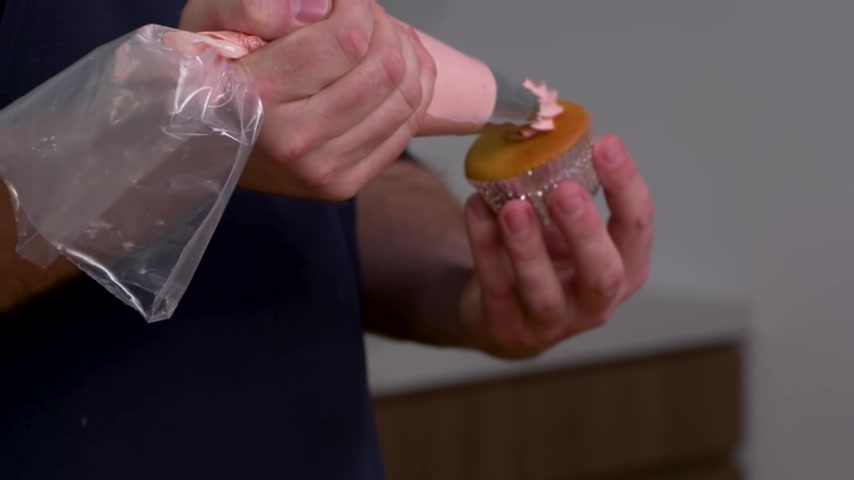
You just take your large star right in the center and then just go around and finish off with a little drag of a tail , something clean and simple .
And it's the right amount of icing on a cupcake .
And that is a large star cupcake .
This is a small star cupcake .
One easy , quick and fun technique to use is just small , little dollops and the teeth on this star is smaller .
You can just do little dollops kind of random .
Some people try to make this look like little cactuses .
I try and not pile too much butter cream on a cupcake .
I think that you really need the right cake to butter cream ratio .
And that is a small star cupcake .
This is a pedal tip and ribbon tip .
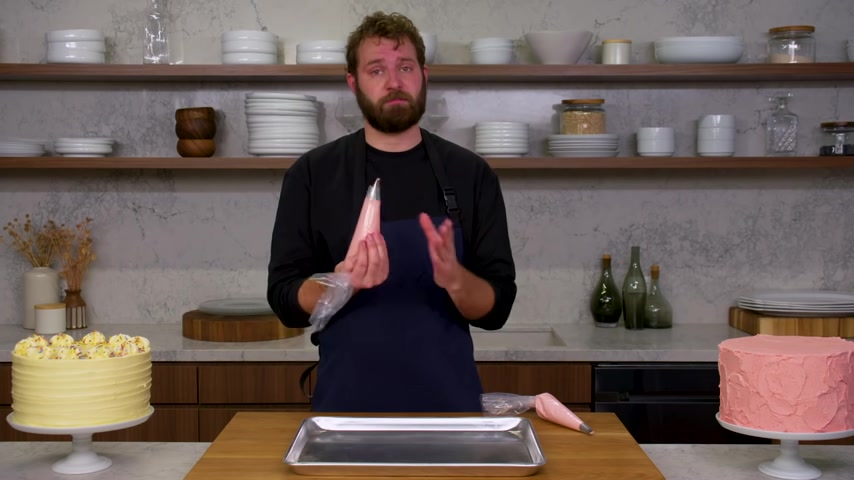
Two other classic tips , I've got an open pedal tip and a ribbon tip here that's got some teeth .
It will be interesting to kind of have them side by side .
We've got a bunch of different things you can do with these .
But one of my favorite things to do is with this pedal tip is a little bit wider at one side and point it at the top .
A kind of teardrop shape .
When I'm going to this sort of ruffle or ruffly ribbon technique , put the thicker part on the bottom .
You could do this horizontally on the side of a cake , you could do this on the top of a cake .
It's kind of versatile .
This is also the same tip that you would use to make butter cream flowers .
So I am going to show you a little ruffle technique starting kind of just going like that a nice even texture , even pressure rather .
And this can be , you can do it kind of like tighter wider , really handy .
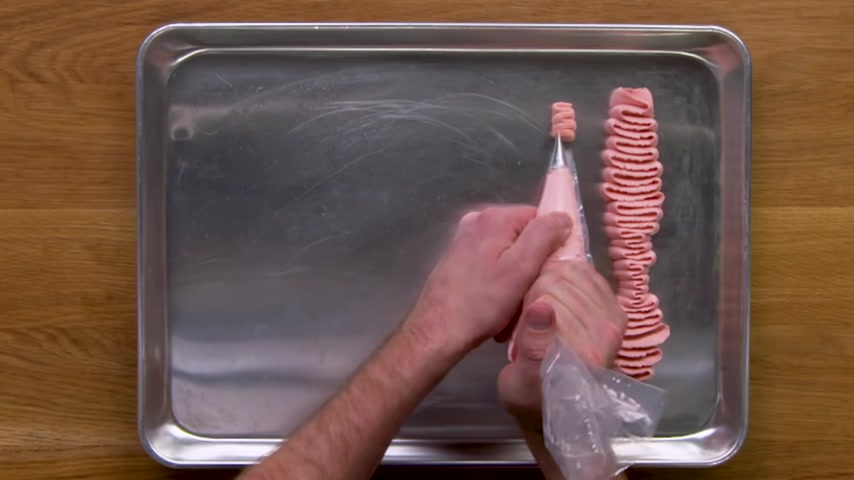
Similarly , with this ribbon tip , you can do the exact same technique just totally different look .
So this I'm going to do the same thing , but it's got teeth and you can do it as tight as you want .
You can kind of space it out to make a bigger zig zag .
You can also lay this one flat , you can kind of get a nice even pull or you can do a similar technique to the shell .
Lots of different options .
With these , another great technique with this little ribbon is you can do a basket weave texture .
So alternating you're just going to do every other basket and then across and then just a little woven texture .
There are an infinite number of tips you can use them in any number of techniques .
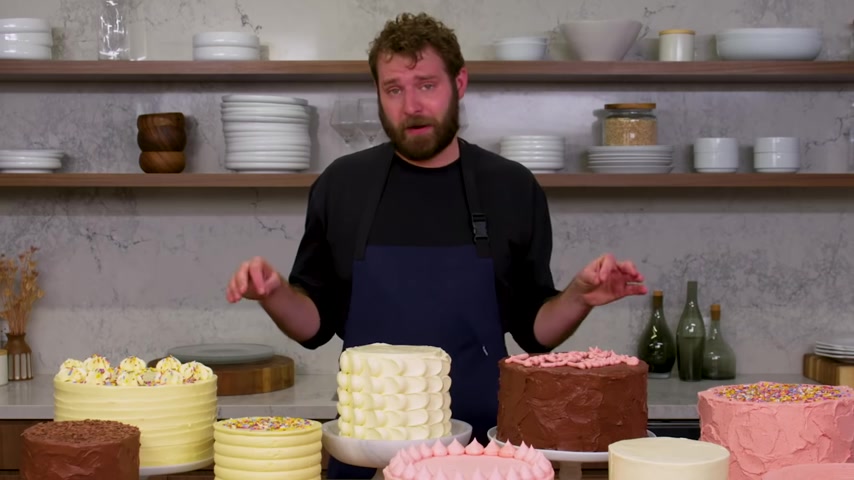
These are just a few easy , simple , classic ones .
And that's a pedal tip and ribbon tip and that's how you frost every cake .
Of course , this is in every way you can ice a cake .
But this is a real great kind of basic classic , useful set techniques that I think are fun and easy and a great base of skills to have .
These are hopefully encouraging and not intimidating and you should be able to at least attempt them at home .
You can always start again , you can always get better , you can always fix your mistakes .
There are really no rules .
It should be just simple and fun .
Are you looking for a way to reach a wider audience and get more views on your videos?
Our innovative video to text transcribing service can help you do just that.
We provide accurate transcriptions of your videos along with visual content that will help you attract new viewers and keep them engaged. Plus, our data analytics and ad campaign tools can help you monetize your content and maximize your revenue.
Let's partner up and take your video content to the next level!
Contact us today to learn more.